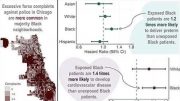To help improve results for the entire family, the first public health survey of new dads has been conducted.
Despite the fact that federal legislation mandates the collection and reporting of data on maternal health behaviors related to childbirth, fathers have been disregarded in public health efforts to enhance maternal and baby outcomes.
Recognizing that new fathers play an important role in the health and well-being of children and families, Craig Garfield, MD, of Ann & Robert H. Lurie Children’s Hospital of Chicago collaborated with the Centers for Disease Control and Prevention (CDC) and the Georgia Department of Public Health to develop and pilot a new survey on new fathers’ health behaviors and experiences.
PRAMS for Dads, based on the annual surveillance tool PRAMS (Pregnancy Risk Assessment Monitoring System) that the CDC and public health departments have used for new moms for the past 35 years, provides data on the special needs of new fathers for the first time. The findings were published in the PLOS ONE publication.
«Having a reliable source of information to see how men are impacted by the transition to fatherhood is an important first step in understanding how to best support families and children today,» said Dr. Garfield, lead author of the study and founder of the Lurie Children’s Family & Child Health Innovations Program (FCHIP). Dr. Garfield is also a Professor of Pediatrics and Medical Social Sciences at the Feinberg School of Medicine at Northwestern University.
«For example, we discovered that 70% of men in our survey were overweight or obese, indicating that public health policies are needed to address this issue, which has serious health implications for the kid and the entire family,» Dr. Garfield added. «Similarly, nearly 20% of parents admitted to smoking, 13% to binge drinking, and 10% to having depressive symptoms since the birth of their child.
These data, especially when combined with information from moms, provide a roadmap for improving the health and well-being of families during pregnancy and following the birth of a child.»
Massachusetts, Ohio, and Michigan are three more states that are starting to emulate the piloting approach and the comparatively low-cost method of surveying new fathers.
Dr. Garfield stated, «We have the tools and are ready to go.» «We need state-level partners who can acquire funds and put this surveillance system in place for dads in their state. On a national level, we need the legislative will to develop the public health infrastructure to track and respond to the needs of new dads, just as we have had decades of government funding to track the health of new moms.»
Previous research has linked fathers’ involvement with better maternal and infant health, including longer breastfeeding duration, lower maternal depression, earlier prenatal care initiation, higher utilization of postnatal care services, and better child developmental, psychological, and cognitive outcomes.
Men frequently consider the birth of their child as a lever for changing their own health practices, according to studies.
«Fathers have an opportunity to enhance their own health via fatherhood, and healthy fathers are more likely to participate in childrearing, help moms in parenting, and have healthy children,» Dr. Garfield continued.
Dr. Garfield created the Family & Child Health Innovations Program (FCHIP) at Lurie Children’s in 2020, focusing on the role of dads in the health of children and families. The FCHIP team conducts research, disseminates clinically relevant results, and pushes for legislative changes that benefit families.






Be the first to comment on "To help improve results for the entire family, the first public health survey…"